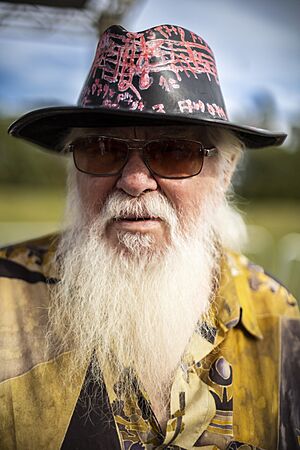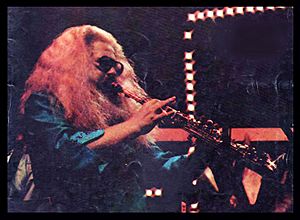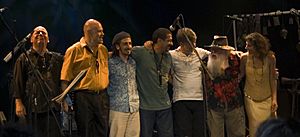Hermeto Pascoal facts for kids
Quick facts for kids
Hermeto Pascoal
|
|
|---|---|

Hermeto Pascoal in 2023
|
|
| Background information | |
| Born | June 22, 1936 Lagoa da Canoa, Alagoas, Brazil |
| Died | September 13, 2025 (aged 89) Rio de Janeiro, Brazil |
| Genres | Jazz, Forró, Samba |
| Occupation(s) | Musician, composer |
| Instruments |
|
| Years active | 1964–2025 |
| Labels | Band/musisi |
Hermeto Pascoal (born June 22, 1936, died September 13, 2025) was a famous Brazilian musician and composer. He was born in Lagoa da Canoa, Alagoas, Brazil. Hermeto was known for playing many instruments and for his amazing ability to create music on the spot, which is called improvisation. He also helped produce and contribute to many music albums in Brazil and around the world.
Contents
The Musical Journey of Hermeto Pascoal
Early Life and Musical Beginnings
Hermeto grew up in a part of Northeastern Brazil where there was no electricity when he was a child. His father taught him to play the accordion. Hermeto spent many hours practicing inside because he was born with albinism. This condition made his skin and eyes very sensitive to the sun, so he couldn't work outside with his family.
From a very young age, Hermeto played the sanfona, which is a type of accordion. When he was eight, he learned the flute. Hermeto was a child prodigy, meaning he was incredibly talented and taught himself a lot. At age eleven, he began performing with his brother, Jose Neto Pascoal, and his father, Pascoal José da Costa.
In 1950, his family moved to Recife. There, Hermeto played in groups that started getting played on the radio. By 1960, he also learned the saxophone and formed a group called Som Quatro.
His professional music career began in 1964. He played on several Brazilian recordings with new and exciting groups. These recordings, and the musicians like Edu Lobo, Elis Regina, and Cesar Camargo Mariano, helped create new styles of Brazilian jazz music after the popular bossa nova era.
In 1966, Hermeto joined the Sambrasa Trio with Airto Moreira. They released one album. Later, he joined Trio Novo, which became Quarteto Novo in 1967. Their album helped make Hermeto and Airto Moreira famous. After that, Hermeto joined another interesting group called Brazilian Octopus.
Gaining International Recognition
Hermeto first became known around the world when he appeared on Miles Davis's 1971 album, Live-Evil. He played on and composed three songs for the album. Miles Davis, a very famous jazz musician, even called Hermeto "the most impressive musician in the world"!
He also worked with other Brazilian musicians like Airto Moreira and Flora Purim. From the late 1970s, Hermeto mostly led his own bands. They performed at many famous places, including the Montreux Jazz Festival in 1979. His band members included bassist Itibere Zwarg, pianist Jovino Santos-Neto, and percussionists Nene, Pernambuco, and Zabelê.
People called Hermeto o Bruxo, which means "the Sorcerer," because of his magical way with music. He often made music using unusual things like teapots, children's toys, and even sounds from animals! Of course, he also played many regular instruments like keyboards, accordions, flutes, and guitars.
He loved to use nature in his music. For example, in his piece Música da Lagoa (Music of the Lagoon), musicians would make bubbling sounds with water and play glass bottles while in a lagoon. A TV show in 1999 even showed him singing into a cup with his mouth partly in water! Traditional folk music from rural Brazil also greatly inspired his work.
Between 1996 and 1997, Hermeto created a special project called Calendário do Som (Calendar of Sound). This project has a unique song for every single day of the year, even February 29th! This means everyone could have a special song for their birthday.
He later moved back to the Jabour neighborhood in Bangu, Rio de Janeiro. There, he spent a lot of time writing music, practicing, and welcoming musicians from all over the world.
In 2019, his album Hermeto Pascoal e Sua Visão Original do Forró won a Latin Grammy Award for being the Best Portuguese Language Roots Album. This was a big honor for his music!
Family Life and Legacy
Hermeto Pascoal was married to Ilza da Silva from 1954 until she passed away in 2000. He dedicated many of his songs to her. They had six children: Jorge, Fábio, Flávia, Fátima, Fabiula, and Flávio, and also many grandchildren. Later, Hermeto was married to Aline Morena from 2003 to 2016. During this time, they lived in Curitiba, Paraná, Brazil.
Hermeto Pascoal passed away in Rio de Janeiro on September 13, 2025, when he was 89 years old. He died due to health complications. His unique approach to music and his incredible talent left a lasting impact on the world.
Notable Music Albums
Hermeto Pascoal created many albums as a leader and contributed to many others. Here are a few examples of his work:
As a Leader or Member
- 1964: Conjunto Som 4 (with Conjunto Som 4)
- 1967: Quarteto Novo (with Quarteto Novo)
- 1970: Hermeto Pascoal (his first solo album)
- 1977: Slaves Mass
- 1987: Só não toca quem não quer
- 1999: Eu e eles
- 2018: E sua visão original do forró (Latin Grammy winner)
- 2024: Pra Você, Ilza
As a Contributor to Other Artists' Music
- 1970: Natural Feelings, by Airto Moreira
- 1970: Live-Evil, by Miles Davis
- 1976: Open Your Eyes You Can Fly, by Flora Purim
- 1979: Live in Montreux, by Elis Regina
- 2003: Serenata: The Music of Hermeto Pascoal, by Mike Marshall and Jovino Santos Neto
- 2023: Beams, by Dan Costa (composer)
See also
 In Spanish: Hermeto Pascoal para niños
In Spanish: Hermeto Pascoal para niños



